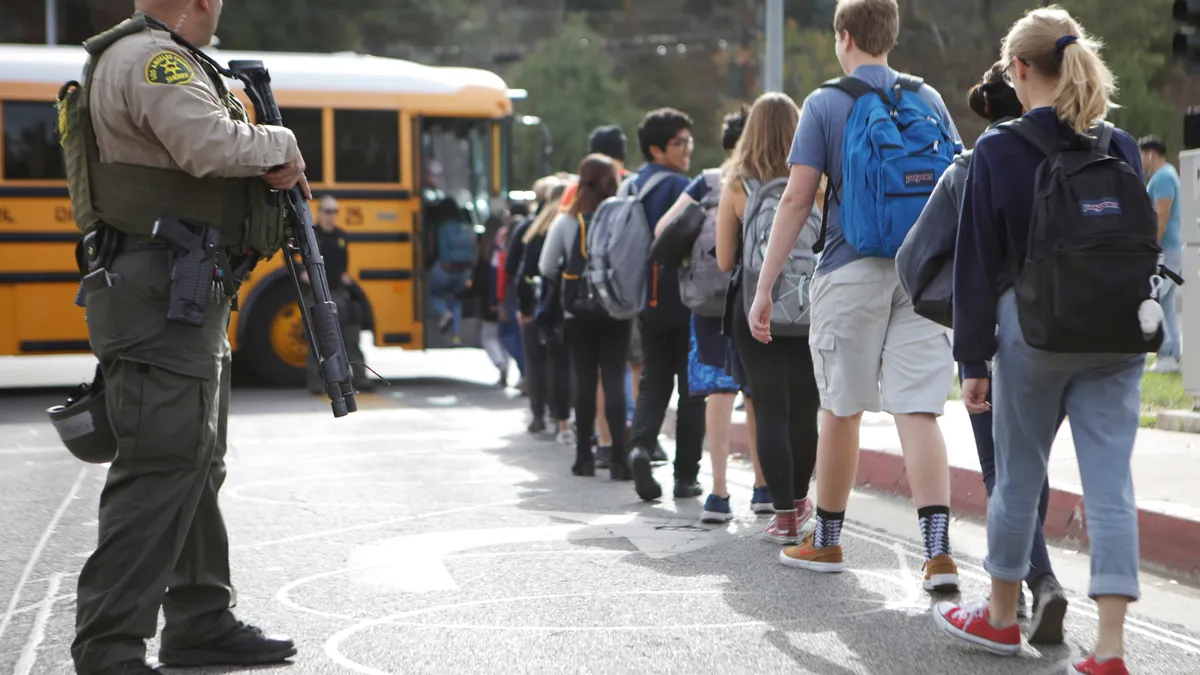Dive Brief:
- Research detailed in a working paper from researchers at the University of Albany and RAND Corporation, published by the Annenberg Institute at Brown University, suggests school police don't prevent school shootings or gun violence in schools, and worsen rates of suspension, expulsion, arrests and police referrals for Black students, as well as chronic absenteeism rates for students with disabilities.
- The increase in punishment through suspension, expulsion, police referrals and arrests in the presence of an SRO is twice as high for Black students when compared to their White counterparts, with particular disparities at the middle and high school levels. Increases are also greater for students with disabilities when compared to other students.
- While SROs seem to help with general safety by decreasing unarmed violent offenses like fights, researchers found they may instead marginally increase the chances of firearm-related incidents on school grounds. The latter finding, however, should be interpreted "very cautiously," Sorensen said. The study used national school-level data between 2014-2018 from the U.S. Department of Education.
Dive Insight:
Districts' decisions to cut or change school police programs were among the most immediate changes following the murder of George Floyd, a Black man from Minneapolis, at the hands of police, and the killings of other Black Americans. In response to those changes, school police advocates often cite school gun violence, especially the predicted increases following COVID-19 shutdowns, as a reason to keep SRO programs in place.
However, Lucy Sorensen, a researcher on the study, said in an email conclusive evidence shows SROs do not prevent school shootings. But they may instead slightly increase the chances of firearm-related incidents on school grounds.
"The coefficient is positive, so we cannot rule out that they actually increase school shootings, but we also cannot rule out that they don’t," she added. "If the positive effect is real, it could potentially be because sworn law enforcement officers bring their own firearms to school campus."
Any accidental or intentional discharge of a firearm is considered a “school shooting,” which could explain the increase if there really is one, Sorensen added.
Regardless of the possibility of SROs increasing school shootings, Sorensen and researchers Montserrat Avila Acosta, John Engberg, and Shawn Bushway still say the benefits of SROs in maintaining overall safety come at "a high cost" when compared to the increases in exclusionary discipline and arrests of Black students and students with disabilities.
The impact of SROs on discipline and retention rates emerges despite the fact school police are often not meant to handle disciplinary matters. Previous studies have also found Black students are much less likely than their White peers to feel safe at school in the presence of police.
Following the introduction of full-time school police, Black students were also the only subgroup to experience an increase in retention rates in the new research.
"The results of this study present a difficult set of tradeoffs," researchers conclude. "Although our study does not perform a cost-benefit analysis, we encourage districts to consider these effects of SROs in comparison to other potential investments to prevent violence in schools, including restorative practices."
Although many districts promised to reevaluate their SRO programs following Floyd's murder and related protests, anecdotal evidence shows those changes have mostly stalled. Some tweaks include using "soft" uniforms like polo shirts with police gear still included, adding body cameras, and providing training for SROs, which advocates say can make them better equipped to create a positive school environment. In other places, districts walked back on changes after community pushback.
"I think, for the most part, we're seeing at least circumstantial evidence that most communities are satisfied with their SRO programs," Mo Canady, executive director for the National Association of School Resource Officers, previously told K-12 Dive.










